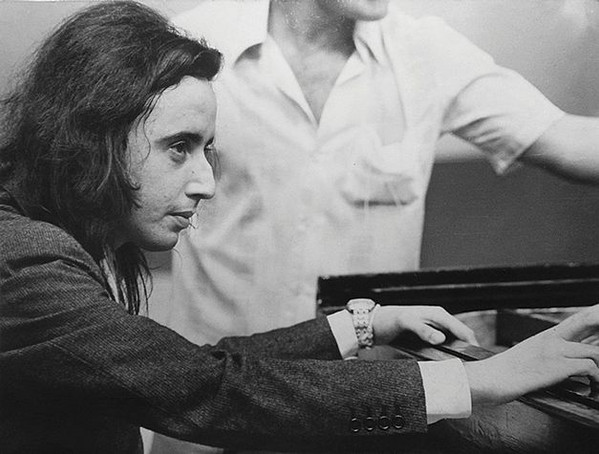
Guilherme Vaz
p, perc, 1948-2018 BR
Classical, Folk, World and Jazz
Guilherme Vaz was born in Araguari, Brazil in 1948. Died April, 2018. He was living in Rio de Janeiro. A pioneering artist in sound-art, he graduated from the Universidade Nacional de Brasilia together with Rogério Duprat, Décio Pignatari, Nise Obino, Cláudio Santoro, Damiano Cozzela, Régis Duprat, Hugo Mund Junior, among others (1960-1964); and from the Universidade Federal da Bahia, where he studied alongside Walter Smetak and Enrst Wiedmer (1964-1966). He co-founded, in partnership with Frederico Morais, Cildo Meireles and Luiz Alphonsus, the Experimental Unit of the Museu de Arte Moderna do Rio de Janeiro (1968-1970). In 1973 he participated in Feedback Studio in Cologne, Germany. He presided over the Fundação Cultural de Ji-Paraná, on the border with Bolivia, where he developed anthropology work, visual art and pre-historic music with the indigenous Zoró-Panganjej, Gaviao-Ykolem and Araras people of South America. He also produced musical instruments as well as paintings, using the techniques of the indigenous people by transferring the corporal geometrical paintings onto the large raw cotton canvases of the kind made by indigenous people. A multimedia and experimental artist, he authored sound works like: Walk to Anywhere, Rio de Janeiro (1970); Desapropriaçao de Manhattan, Rio de Janeiro (1970), Open your Door as Slow as you Can, Rio de Janeiro (1970); Solos Ardentes, New York (1970); Crude, Paris (1973); Ensaio sobre a Dádiva, d´apres Marcel Mauss, Oslo (2008). His work was included in important group exhibitions, significant among which are: Uma Fração do Infinito, CCBB/ Rio de Janeiro (2016) and Sesc Pompéia, São Paulo (2017), Equatorial Rhythms, The Sternesen Museum, Oslo (2008); Hélio Oitica e seu Tempo, Centro de Arte Hélio Oiticica, Rio de Janeiro (2006); VIII Biennale de Paris, Museé d´Art Moderne de la Ville de Paris (1973); Agnus Dei, Petite Galerie, Rio de Janeiro (1970); Information, The Museum of Modern Art (MoMA), New York (1970); and Salão da Bússola, Sala Experimental, Museu de Arte Moderna do Rio de Janeiro (1969), and many others. He also released the following recordings through OM Records: O Vento sem Mestre (2007); Sinfonia dos Ares (2007); La Virgen (2006); Deuses Desconhecidos (2006); Anjo sobre o Verde (2006); A Tempestade, El Arte, Povos dos Ares, Der Heiligue Spruch (2005); A Noite Original - Die SchopfungsNacht [Die Winde uber der Meer am Anfgang der Welt] (2004); Sinfonia do Fogo (2004); O Homem Correndo na Savana (2003), all presented in the Museu de Arte Contemporânea de Niterói (MAC). He published Sinfonia das Águas (2001), a book in which he researched and collected some of the deepest, most archaic and meaningful sound conjunctions from the heart of South America. Deeply rooted sound traditions were brought from the indigenous population, some of which were only possible to obtain after extensive travels. The artist brought these sound conjunctions to the context of contemporary art through a series of more than 75 different sound sources - the contemporary symphonic orchestra permeates his book with archaic and classical visualities from South America. It is an art book formatted as a text-book, with images and techniques displayed in such a manner so that, technically speaking, the works could be executed to perfection by any symphonic orchestra in the world. He won the First Prize for Best Soundtrack at the Festival de Brasília do Cinema Brasileiro for Fome de Amor, directed by Nelson Pereira dos Santos, the first Brazilian film with concrete and experimental music (1968). Other works include soundtracks for A Rainha Diaba by Antonio Carlos Fontoura (1975), O Anjo Nasceu by Julio Bressane (1969), Filme de Amor by Julio Bressane (2006), Cleopatra by Julio Bressane 2007 and in 2009 the release of the film Erva do Rato by Julio Bressane at the Venice Festival, with the soundtrack receiving critical acclaim.
Instruments
Genres
Discography
| Title | Artist | Year | Type |
|---|---|---|---|
| La Virgen | Guilherme Vaz | 2006 | Album |
| O Homem Correndo Na Savana - AnhangueraParanaíba | Guilherme Vaz | 2003 | Album |
